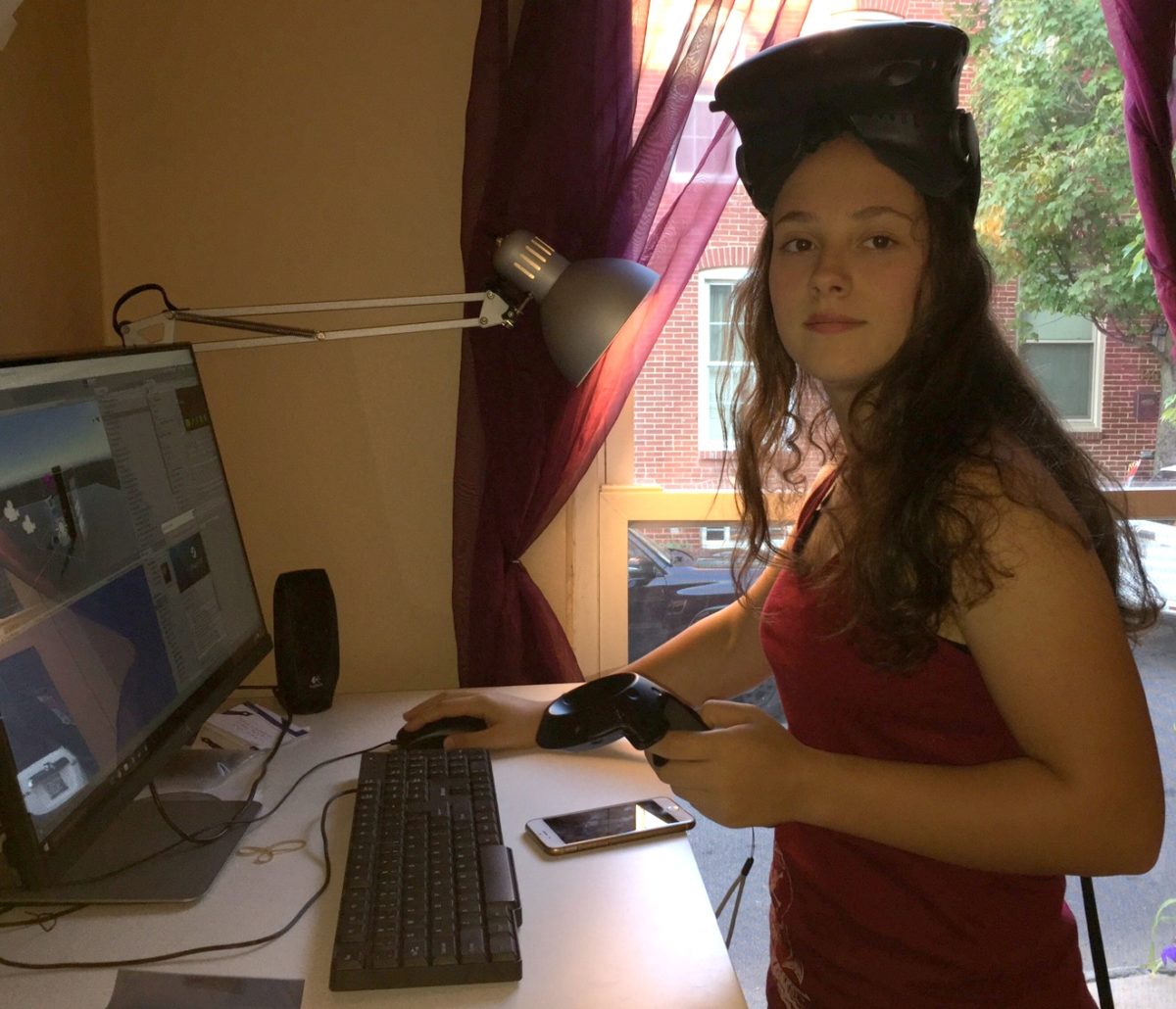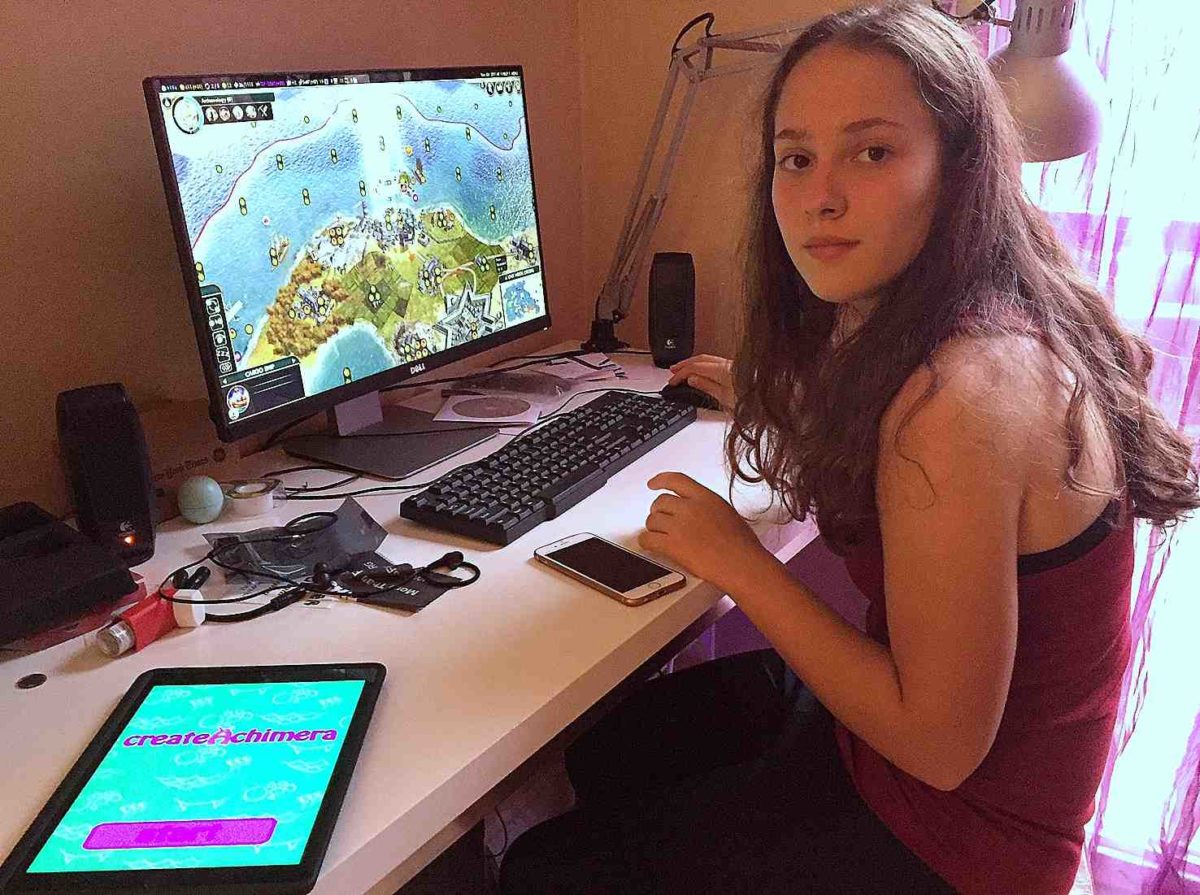Christabella Palumbi isn’t your typical middle schooler.
In her free time, she could be learning a new coding language or putting the finishing touches on a virtual reality application for the iTunes store. She might be preparing for her next hackathon or attending a Baltimore tech event — I met her at Technical.ly’s Super Meetup last month. Christabella, who goes by Bella and attends the private Calvert Middle School in Baltimore’s Tuscany-Canterbury neighborhood, is something of a unicorn not just because she’s working on advanced side projects as fourteen-year-old, but because she’s a girl interested in a technology career path.
In 2015, only 25 percent of computing jobs were held by women, according to the National Center for Women & Information Technology. If that trend continues, that means that out of the 1.1 million computing-related job openings expected by 2024, only a quarter of them will be held by women. It’s girls like Bella who are changing that statistic and could go on to help women find equal footing in a male-dominated industry.
Bella’s journey into the world of programming began in the summer of 2013. Curious about the technology industry, the then-eleven-year-old Bella enrolled in a two-week youth summer camp at the Digital Harbor Foundation for mobile gaming.
“The program was supposed to be for high schoolers, but even though I was in fifth grade, well, they just let me in,” Bella recalled.
She managed to complete the tutorial portion of the program ahead of the curve, giving her ample time to start her first ever mobile game.
After four days of mobile game programming experience, Bella began the early stages of what would become Monkey Mayhem. In the game, users fight off some unruly monkeys with a slingshot in order to collect bananas that they can then use to unlock upgrades. Altogether, the app took her a month and a half to create, finally reaching the app store in the fall of 2014.

Needless to say, she was hooked into the programming world. Shortly after the Digital Harbor Foundation’s summer camp, she signed up for their Maker Foundations program.
“There were about twenty people in the program, but I was the youngest there by about three years,” Bella remembered.
The age discrepancy did not deter her, or the fact that she was one of only three girls in the program.
“It was a little strange working with older people, you know?” she said. “But you can do a lot of stuff that’s independent and self-based work. I just went there and sorta did my own thing. I did wish there were more girls there, but even if there was another fourteen-year-old developer there that would have been really good.”
She believes that it’s the social pressures and stigmas placed on individuals involved in the technology industry that have kept other girls from the Maker Foundations program.
“Girls kind of stick together and it can be a bit scary to them to do something that their friends aren’t,” she said. “Then there is the stigma that guys are locked up in their basement all the time, but that’s not really true. I do like to work by myself in my house at times, but I also like to go to events.”
One thing is certain — Bella is not a basement dweller. She has participated in two hackathons, winning prizes for both projects that she has been involved in. It was her mother that signed her up for her first hackathon, the fourth annual Baltimore Hackathon, when her daughter was thirteen years old.
“I was really nervous because I had never been in a hackathon,” Bella said. “I mean, there weren’t rules against kids, but I knew it wasn’t a youth event since it was run by the tech center.”
She fought her mom about going, scared of what it would mean to be a young girl competing against individuals potentially twice her age.
“I remember very distinctly walking down the street toward the event, and we were three minutes from the door and I was still trying to go home, she said.
Sometimes mothers know best.
Programming, Bella says, is not as hard as it looks.
Bella loved the event, partnering with a woman named Kathleen Mazurek on developing a conflict resolution application geared towards helping kindergarteners and first graders. The kids would work together using the game to build a mythological chimera, exploring their emotions along the way. At the conclusion of the hackathon, the pair won $2,000 for their app. They split their winnings in half. Bella bought a HTC Vive and a new computer with her share of the prize money.
So far, she said, she’s been met with an overwhelming amount of support by the technology community. The adults she has encountered along the way have encouraged her without patronizing her, giving the young programmer the tools she need to succeed along the way. Now that she is a bit older and girls younger than her are entering programs at the Digital Harbor Foundation, she wants to be an example of what women can do in technology.
“I want to be a role model to them in a way that I wish I had when I was in the program,” she said.
If she could tell them anything, it would be to “try something and put yourself out there because in terms of programming itself, it is not as hard as it looks.”
She continued:
As long as you keep your expectations realistic, you will be able to make a simple thing relatively quickly. In time, you’ll be able to make bigger things. Just go try things. I was scared to go to the hackathon but I went and it was great. Just try it, put yourself out there and it will probably turn out pretty good.
Looking to the future, Bella would like to work more with programming games that are virtual reality compatible. The learning curve is a bit steeper, but she is ready to learn.
As for her upcoming VR projects?
“I have some ideas, but I’m not going to tell you because they aren’t fully thought out and I want to keep them secret,” she said. She’s a natural.
Until then, Bella will keep polishing off her current projects, coming up with new ideas and practicing different coding languages. Oh, and maybe prepare for her freshman year of high school.







